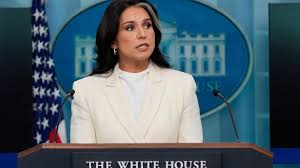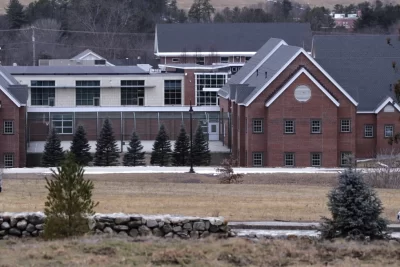
CHICAGO — Vice President Kamala Harris urged Americans to seize a “precious, fleeting opportunity” to move beyond political divisions and the threat of Republican Donald Trump on Thursday as she closed out the Democratic National Convention.
Harris is the first Black woman and first person of South Asian descent to be nominated, and supporters throughout the convention crowd turned out in white to mark the moment. The convention also featured rising stars of the Democratic party, survivors of mass shootings and others who showcased pressing issues in American life.
The crowded lineup reflected the immense work Democrats have before them as they’ve stood up a fresh presidential campaign in just under a month since President Joe Biden bowed out of the race.
Here are some takeaways from the Democrats’ final night.
Democrats for change
Harris’ speech completed a remarkable four-day effort by the party in the White House to contend that it is the real change agent in this election.
Democrats were helped in making that argument by Trump’s outsized presence in the political dialogue over the past nine years. They got another boost when Biden stepped aside for Harris, giving voters a fresh choice.
Harris tried to capitalize on that, telling delegates and the nation: “With this election, our nation has a precious, fleeting opportunity to move past the bitterness, cynicism and divisive battles of the past.”Her running mate, Minnesota Gov. Tim Walz, made a similar pitch a day earlier when he wrapped up his speech by slamming Trump and his running mate, Ohio Sen. JD Vance, saying, “I don’t know about you, I’m about ready to turn the page on these guys.”
The Trump campaign, for its part, argues that voters want to turn the page on the Biden-Harris administration and the past four years.
Playing to fear as much as joy
As much as her campaign is about joy, Harris devoted a considerable chunk of her speech to what she said were the risks of another Trump term, calling the election “one of the most important in the life of our nation.”
Her focus on Trump showed that fear remains a powerful motivator for many voters and she wants to tap into that.
Harris described how Trump inspired the Jan. 6, 2021, assault on the U.S. Capitol and his fraud conviction. She talked about his willingness to deploy the military against U.S. citizens — and the ability to do so with immunity from criminal consequences due to a recent Supreme Court ruling.
“Just imagine: Donald Trump with no guardrails,” she warned.
Job One: Telling her origin story
Harris’ first order of business upon taking the convention stage was introducing herself.
Her sudden elevation after Biden’s abrupt withdrawal from the race means many people are just now starting to size her up.
That presents an opportunity for her — and a risk if Trump and his allies succeed in defining her first. On the convention stage, Harris told her origin story with warmth, humor and intensity.
She detailed the unlikely pairing of her parents: two students — one from India, the other from Jamaica. Her family’s many moves across the U.S. And her own desire to become a lawyer after discovering a high school friend had been sexually abused.
And she placed particular emphasis on the work ethic that her mother instilled in her.
Firsts not mentioned
Harris would be the first woman president if she wins, as well as the first South Asian, the first Black woman. That’s been brought up by dozens of convention speakers. But the candidate herself didn’t mention it.
Harris acknowledged that hers was an “uncertain journey,” the daughter of Indian and Jamaican immigrants who was raised by a single mother after her parents split up. But she didn’t dwell on the historic nature of her candidacy.
That’s in stark contrast to the last woman to lose to Trump, Hillary Clinton, who made breaking the glass ceiling a key part of her campaign. Instead, Harris seems to be following the path of Barack Obama, who didn’t have to tell everyone he’d be the first Black president, but threaded his life story into an argument for why voters should back him.
A new generation gets its moment
in the spotlight
The convention didn’t just formally mark the exit of 81-year-old Biden from the campaign. It served as a showcase for the younger Democrats in the political talent pool.
Speakers included swing state up-and-comers like Michigan Gov. Gretchen Whitmer, who painted Trump as out of touch and told delegates that “with Kamala Harris, she gets us. She sees us. She is us.” Others featured during the week: Pennsylvania Gov. Josh Shapiro and Arizona Sen. Mark Kelly, both of whom made the shortlist when Harris was searching for a running mate.
Michigan Attorney General Dana Nessel brought down the house with her address earlier in the week when she warned Republicans and the U.S. Supreme Court, “You can pry this wedding band from my cold, dead, gay hand!”
There were also rising blue-state celebrities like California Gov. Gavin Newsom, Maryland Gov. Wes Moore, Angela Alsobrooks, Maryland’s Democratic nominee for an open Senate seat, and 34-year-old New York Rep. Alexandria Ocasio-Cortez — all of whom are seen as representing a new generation of Democrats.
It was only a few years ago that Democrats worried they had too little talent in the pipeline, after scores of officeholders were wiped out in the off-year elections under President Barack Obama. But they’ve seen a resurgence in the Trump era.
Palestinian supporters never got to address the convention
Pro-Palestinian delegates never got the chance to take the stage and address the convention. It was a reflection of how the party has tried to avoid one of the more divisive issues of this election season as the U.S. alliance with Israel has become a political flashpoint.
Israel’s response to the Oct. 7, 2023, attack by Hamas has spurred outrage over mass casualties and human rights violations in Gaza, and pro-Palestinian demonstrators have marched outside the arena each day.
“Uncommitted” delegate Abbas Alawieh had been in talks with DNC officials about speaking to the hall. After being rejected, he and other delegates chose to spend Wednesday night on the sidewalk outside the convention hall in protest.
“When we ran out of options as uncommitted delegates, we just sat down,” Alawieh said Thursday.
Harris declared she would “always stand up for Israel’s right to defend itself,” while saying “at the same time” that the “scale of suffering” in Gaza is “heartbreaking.” She indicated that the suffering could end with a cease-fire and the release of hostages taken in the October raid. On Wednesday, the parents of one of the young men being held hostage in Gaza addressed the convention.




